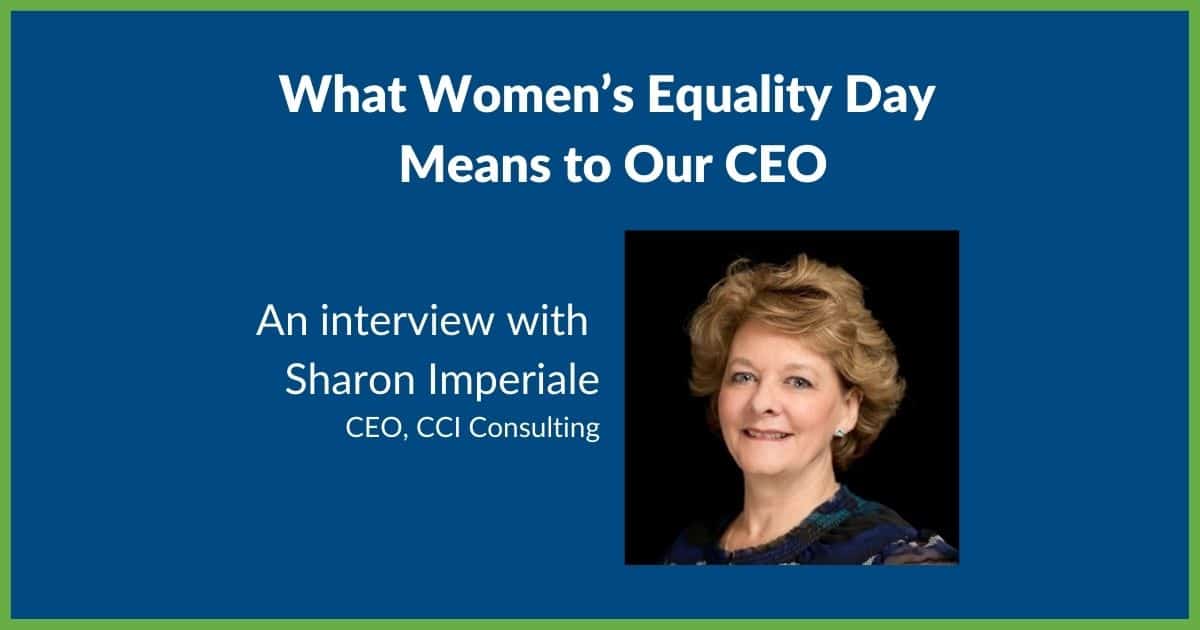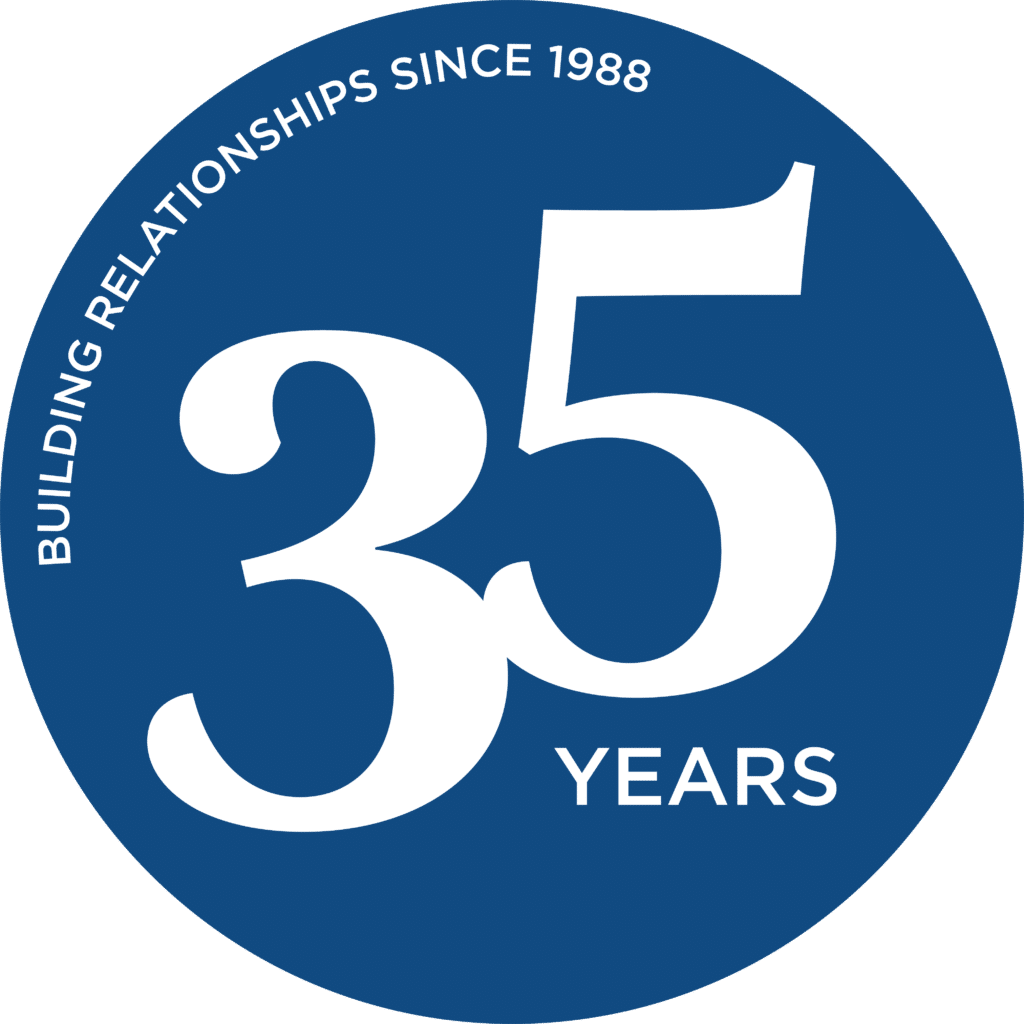August 26th marks Women’s Equality Day, a day that commemorates the passage of the 19th Amendment to the U.S. Constitution, granting the right to vote to women. As a women-owned business with proven success employing and empowering women in business, we wanted to celebrate this day by talking to someone who directly supports women’s equality. We sat down with our CEO, Sharon Imperiale, to hear her thoughts on women’s equality, how the workforce has changed since she started her career, and her personal experience as a woman leader. Here is what she had to say:
What does Women’s Equality Day mean to you?
The day makes us take a step back and reflect about progress as well as regression and where we need to take the full issue of equality. It is certainly easy to share stories of the past and lament about what was, and while history gives us perspective and guidance, the lamenting part is counterproductive. I also do not believe that this is a one-size-fits-all issue. My ideal of equality fits my life and my time—the best is yet to come. On a broader basis, it’s about having the same choices and opportunities as everyone else.
By contrast, realize that in 1975 (my college graduation) Time magazine awarded their “Man of the Year” to “American Women, citing “They have arrived like a new immigrant wave in male America. They may be cops, judges, military officers, telephone linemen, cab drivers, pipefitters, editors, business executives – or mothers and housewives, but not quite the same subordinate creatures they were before. Across the broad range of American life, from suburban tract houses to state legislatures, from church pulpits to Army barracks, women’s lives are profoundly changing, and with them, the traditional relationships between the sexes. …1975 was not so much the Year of the Woman as the Year of the Women – an immense variety of women altering their lives, entering new fields, functioning with a new sense of identity, integrity and confidence.”
Have we come a long way, baby?
How have women’s positions in the workforce changed since you started your career?
My career began in the ‘70s when the norm was to be a teacher or a nurse according to our families. Those of us who deviated were securitized. I was lucky. My parents, although working class, did not abide by the norms…they pushed me to discover my potential. I went to an all-girls school and we had science and math courses, no home economics. That provided confidence. In the workforce, there was a bias towards men in leadership positions, especially when they were “supporting a family.” A choice: let that hold you back or rely upon the confidence that you gained and use it to challenge the standard. Women choosing to prove themselves as a choice in a career was the beginning of this long road to equality.
What obstacles/issues still exist for women in the workplace?
One of the issues that surely has bubbled to the top of this issue during the pandemic is work-life balance. Are employers ready and willing to tackle this? Some of it is about on-the-clock face time and the archaic belief that you need to work 15 hours a day to satisfy a work ethic perception instead of exhibiting that you accomplished the job in 9 hours. It’s time to say goodbye to “hours worked’ rather than goals achieved. And again, it’s about women having the confidence to not apologize for raising children and declare their success in doing both.
How have you made strides to break the glass ceiling?
For me, I think it is different. I’m here because I took great risks in leaving a corporate position and joining the entrepreneurial ranks. Even here, I have had to find my voice. I joined a board and took the position of chairperson, which was way out of my comfort zone, yet I needed to prove to myself that I could practice what I preached and be good at it. We will keep hitting our heads if we do not jump hard and high enough. Many bruises later, you can reach your goal… and it should be where you want it to be, not where others think you should be.
What advice would you give young women starting their careers?
Define your own boundaries. Until we stop feeling marginalized, it will not change. Sure, there are obstacles to managing your career to meet your goals. The operative notion is “manage your career.” Find the right culture, the right mentors, and have a plan. In hindsight, I dove in the deep end without looking and luckily did not bottom out!
What do you think employers can do more of to support women’s equality in the workplace?
Recognize the value of a diverse and inclusive workforce regardless of any aspects of our differences. For women, deal with the issues plaguing the divide such as wage disparity, work life commitments, and gender bias. Involve everyone in the solutions, as we need to address this as a work community, not just as women.
Who has inspired you professionally? How do you hope to inspire/ empower other women?
It may sound like a cliché, but first my parents for giving me all they could even when they made personal sacrifices. They set the example. Ironically, two people within my corporate career were both men. They trusted the results I achieved and pushed me forward through so many rotational assignments, which was so key to success. There are also outsiders that set the pace like Ruth Bader Ginsburg, Eleanor Roosevelt, Gloria Steinem, etc.
Trust is key to empowerment and I have a high degree of openness to trust. That has helped me align with some very strong and successful women. Mutually believing in goals, recognizing results and talent, and taking a chance on someone even though there was not a direct resume match has allowed me to realize success. People took a chance on me, and I am paying that forward.
In your career as a leader and CEO, how have you managed gender equality?
I cannot not say the word confidence enough. I appreciate the role women play at home and in the workforce and see neither as mutually exclusive. I know we can do both and do it well. I raised three children while working, and while not always the role model for balance, I can offer it to others in rectification of my own short comings. It’s how I started this…we need to look forward, use the past for a point of reference against the progress, and recognize talented individuals for the results they bring to the table.



